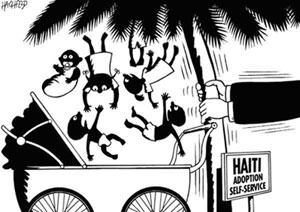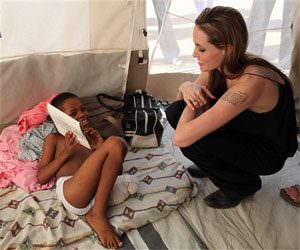Kidnapping Is Not Charity
Even in the midst of a terrible natural disaster, spiriting away a busload of kids -- with vague plans to worry about the "paperwork" later -- is no act of charity.
Anyone sitting in a dank, fetid Haitian jail for any reason probably deserves at least a measure of sympathy, so in that sense I feel sorry for the Baptist missionaries from Idaho charged with kidnapping 33 “orphans” and trying to take them out of the country. But what the do-gooders allegedly did was not just misguided. It could be criminal, and Haitian authorities are right to hold them accountable.
Even in the midst of a terrible natural disaster, spiriting away a busload of kids in that manner — with vague plans to worry about the “paperwork” later — is no act of charity. The missionaries’ misadventure can only make the work of those truly interested in the welfare of neglected or abandoned children more difficult.
It doesn’t help the missionaries’ case that their leader, 40-year-old Laura Silsby, has, according to The Idaho Statesman, “a history of failing to pay debts, failing to pay employees and failing to follow Idaho laws.” The newspaper reported last weekend that Silsby has been the target of eight lawsuits and 14 claims for unpaid wages, mostly relating to an Internet business that she founded in 1999, and also that she had received four traffic citations since 1997 for having failed to register or insure the vehicle she was driving.
The Statesman also reported that “the $358,000 house in a Boise suburb where [Silsby] founded her nonprofit New Life Children’s Refuge in November was foreclosed on in December.” What’s interesting about that isn’t the foreclosure but the time frame: Silsby’s initiative to establish her own orphanage, or “refuge,” for Haitian children was just weeks old. The group planned to set up a facility to house, educate and outplace the orphans in the Dominican Republic.
When the Haiti earthquake struck, Silsby and nine others flew down, assembled a group of 33 boys and girls, and headed for the Dominican border. That was where Haitian police stopped them and discovered they had none of the documents required to take children out of the country.
According to reports from Haiti, it has now been established that many, if not most, of the children were not even orphans. Silsby is believed to have had “permission” from at least some of the children’s parents or guardians to take them away. But in no instance, authorities say, did the missionaries have the proper documentation needed for a surrender of parental rights. And reports from Calebasse, the small town near Port-au-Prince where most of the children lived, indicate that some were handed over by adults who were not their parents — a brother, a godmother, an informal guardian.
Did the Haitian authorities overreact? Not given the fact that thousands of Haitian children are effectively sold into servitude each year, mostly as domestic workers. Known in Creole as restaveks — from the French reste avec, or “stays with” — the children are vulnerable to psychological, physical and sexual abuse. Mostly they are exploited in Haiti, but restaveks have been rescued from the Dominican Republic as well. At the border, Haitian authorities said there was no way to be sure that these people from Idaho had the children’s best interests at heart.
But let’s assume they did. Let’s assume that neither the missionaries nor the Haitians who signed the children away had any kind of nefarious intent. Even if we assume that all anyone wanted was for the children to have better lives, what allegedly took place was still wrong.
Silsby’s intention, according to press reports, was to find American families to adopt the children. I am a huge advocate of adoption, be it international, cross-racial or cross-cultural; the bottom line should be the best interests of the child. But giving up a son or daughter is one of the most wrenching decisions a parent could ever face, and it has to be done right, with ample time to think about it. No parent or guardian should ever have to surrender a child under duress.
I can’t imagine more duress than trying to provide for a family in the days after a disaster of the magnitude of the Haiti earthquake. It was a moment of overwhelming need and despair — precisely the wrong moment to expect a parent or guardian to make a permanent, life-changing decision.
True charity would have been to help those families care for their children — not to put them in a bus and drive them away.
Eugene Robinson’s e-mail address is eugenerobinson(at)washpost.com.
© 2010, Washington Post Writers Group
Your support matters…Independent journalism is under threat and overshadowed by heavily funded mainstream media.
You can help level the playing field. Become a member.
Your tax-deductible contribution keeps us digging beneath the headlines to give you thought-provoking, investigative reporting and analysis that unearths what's really happening- without compromise.
Give today to support our courageous, independent journalists.






You need to be a supporter to comment.
There are currently no responses to this article.
Be the first to respond.